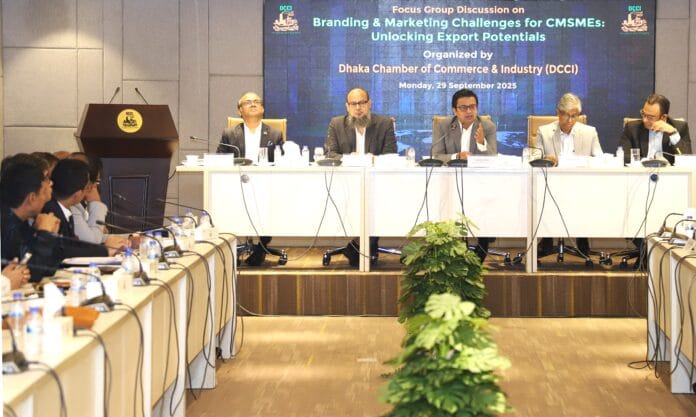Although Cottage, Micro, Small and Medium Enterprises (CMSMEs) contribute about 28% to Bangladesh’s GDP, the share is nearly 50% in Sri Lanka, Vietnam, and Cambodia.
Despite their importance, the sector continues to face obstacles such as limited access to finance, inadequate infrastructure, a shortage of skilled manpower, insufficient policy support, restricted market access, and slow adoption of new technologies.
Dhaka Chamber of Commerce & Industry (DCCI) President Taskeen Ahmed made these observations on September 29, 2025, at a focus group discussion on “Branding and Marketing Challenges for CMSMEs: Unlocking Export Potential.” Md. Obaidur Rahman, Secretary of the Ministry of Industries, attended as Chief Guest, while Md. Saiful Islam, Chairman of BSCIC, and Mohammad Hasan Arif, Vice Chairman & CEO of EPB, were present as Special Guests.
Presenting the keynote paper, Taskeen Ahmed noted that CMSMEs account for 90% of Bangladesh’s industrial sector and employ around 11.8 million people. He warned that recent U.S. tariffs on Bangladeshi exports, particularly garments, will increase production and export costs. To remain competitive, he urged entrepreneurs to strengthen innovation, efficiency, and cost management, while highlighting persistent challenges in import–export operations, high product costs, and weak global competitiveness.
He called for stronger support measures, including certification and compliance facilitation, training and incentives for sustainable technology adoption, branding and product quality improvement, cluster development, integrated policy support, a comprehensive CMSME database, and incentives to attract foreign investment. “We must embrace technology and move beyond traditional thinking if we want to accelerate national development,” he said.
Industries Secretary Md. Obaidur Rahman emphasized that branding and marketing remain critical yet underdeveloped for CMSMEs. The absence of strong national brands, he said, has limited Bangladesh’s export potential. He called for greater involvement of Bangladeshi missions abroad in identifying trade opportunities and announced that both the SME and Industry Policies will be revised to incorporate emerging business sectors. He also stressed the importance of online trading and trademark protection for digital entrepreneurs, while noting that product quality, branding, and intellectual property rights must be prioritized.
BSCIC Chairman Md. Saiful Islam highlighted his agency’s efforts to support entrepreneurs through industrial parks, affordable finance, and training. He mentioned ongoing initiatives to exempt holding taxes in BSCIC parks, urged entrepreneurs to expand to international digital platforms like Amazon and Alibaba, and pointed out weaknesses in packaging, labeling, and international certification. He said BSCIC is developing an integrated CMSME database.
EPB Vice Chairman & CEO Mohammad Hasan Arif emphasized changing local consumer mindsets as a first step to building global product brands. He announced that EPB will establish an Export Ecosystem Platform and a CMSME Help Desk to coordinate government support, while also arranging bilateral meetings and training programs for entrepreneurs. He confirmed that Bangladeshi entrepreneurs will participate in a major trade fair in Brazil next year.
From the financial sector, Muhammad Mustafizur Rahman, Additional Director of Bangladesh Bank, stressed the role of product logos, design, and promotion. He noted that the central bank has issued a circular allowing entrepreneurs to access BDT 500,000 collateral-free loans, with 12% of SME loans already disbursed on this basis.
Other speakers underscored the importance of innovation, packaging, and compliance:
Shamim Ahmed, President of BPGMEA, called for product design that reflects local culture and geography.
Dr. Md. Razzaqul Islam, Deputy Secretary, BPC, announced plans for an Innovation Lab to diversify products and boost exports.
Md. Rashedul Karim Munna, MD of Creation (Pvt.) Ltd., urged mandatory compliance certification for export-oriented SMEs and their inclusion in government procurement.
Md. Shafat Kadir, Founder & CEO of Hat Bakso, said reciprocal U.S. tariffs make branding and packaging even more vital for global competitiveness.
The event was also attended by DCCI Senior Vice President Razeev H. Chowdhury, Vice President Md. Salem Sulaiman, and entrepreneurs from various sectors.

